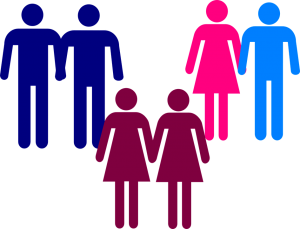Those of us who have been paying attention since January 20th, and who believe that convicted felon and four-times-indicted psychopath Donald Trump should never have been elected President, know full well that our country is in a dangerous place.  Some legal analysts believe we are in a Constitutional crisis, which seems abstract but actually affects all Americans because “the executive branch decided it wouldn’t pay attention to any internal legal constraints;” previous administrations have almost always agreed to police themselves.
Some legal analysts believe we are in a Constitutional crisis, which seems abstract but actually affects all Americans because “the executive branch decided it wouldn’t pay attention to any internal legal constraints;” previous administrations have almost always agreed to police themselves.
There are many reasons that we find ourselves in this place, but here let us take a step back and look at a contributing factor that has been with us for at least several generations. Trump, who is not a “conservative” in any normal American political sense, is riding a wave of right-wing thinking and acting that the Democracy Coalition, liberals, progressives, and left-leaning citizens in general should learn about and be prepared to fight from now until the end of the American experiment (which we hope is a long way off). A modern strain of thought by millions of us, even we do not vote or even pay much attention to politics, is an acknowledgment of basic values: inclusion, fairness, the desire for equality, appreciation for the rule of law, the advantages of diversity, opposition to slavery and Nazism, the place of women in the workplace, and even – in the past decade – the acceptance of gay marriage.
 The problem: those on the far right – who are a minority of the population but have outsized influence – do not agree with what many of us feel are basics. In many ways, citizens and lawmakers have had their heads in the sand taking the basics for granted. Americans on the far right – enabled by millions of more moderate conservatives – have not: they have been laboring for decades, in many ways and many places, to overthrow all things they deem “liberal.”
The problem: those on the far right – who are a minority of the population but have outsized influence – do not agree with what many of us feel are basics. In many ways, citizens and lawmakers have had their heads in the sand taking the basics for granted. Americans on the far right – enabled by millions of more moderate conservatives – have not: they have been laboring for decades, in many ways and many places, to overthrow all things they deem “liberal.”
Why is the right so persistent?
Let us be as clear as possible about whom we are talking: those Americans who might be our friends, neighbors and relatives; elected officials at all levels; pundits and media figures; religious leaders; teachers; business people; members of law enforcement; lawyers and judges; and others. According to recent analyses, approximately 34% of Americans describe themselves as “far right,” “right,” or “center-right.” What are some of the reasons for their mindset, and what does it often lead to in our society?
Much of the thinking of this proportion of the American populace derives from a certain Christian theology (more correctly defined as Fundamentalist than evangelical). They hold to a biblical perspective that maintains “the historical accuracy and inerrancy of the Bible, the imminent and physical Second Coming of Jesus Christ, and Christ’s Virgin Birth, Resurrection, and Atonement.”
Additionally, right-wing Christians often have a mentality of “us against them” and a persecution complex (e.g., because the law often requires them to have their children vaccinated, or they were required to wear masks during the pandemic). Their legalistic bent generally “puts law above grace and relationships,” they believe that only they know the right way to think and act, they have a superiority fixation, and their stances are based on sexism and racism (in a distorted misreading of much of Scripture).
Given these starting points, the following should not surprise us, but we must acknowledge them and understand their impact:
- Far-right Americans, many of them purportedly Christian, do not like what many of the rest of us consider “progress:” more fairness, more opportunity for those who’ve been kept down for centuries, more equality, diversity, and the reform of broken systems.
- They fear difference, including black and brown skin tones.
 They believe the narrative – one that led to the Civil War, Jim Crow laws, the Ku Klux Klan and other shameful aspects of our national history – that black and brown people are inherently inferior so should not have important jobs; if they do get those jobs, the right-wing mentality is that such non-whites won their positions through affirmative action, not because they were competent and qualified. Many whites on the far right consider this to be “reverse discrimination.”
They believe the narrative – one that led to the Civil War, Jim Crow laws, the Ku Klux Klan and other shameful aspects of our national history – that black and brown people are inherently inferior so should not have important jobs; if they do get those jobs, the right-wing mentality is that such non-whites won their positions through affirmative action, not because they were competent and qualified. Many whites on the far right consider this to be “reverse discrimination.”- The white far-right narrative further asserts that black and brown people are inherently dangerous and violent. This has had disastrous consequences not only for innocent victims but for our country as a whole.
- Right-wing Americans adhere to the belief we have laid out earlier about Trump’s disinformation campaign: that government spending is not only wasteful but now also “woke.” Taxpayer money, they believe, goes too often to other countries and “lazy” Americans.
- On sexual issues, right-wing Americans, perhaps especially those who call themselves Christian, have deep-seated animus against LGBTQ+ people. Their “rational” arguments are based on certain verses in the Bible that condemn same-sex relationships, but scholars have shown time and again that these passages are often taken out of context. Furthermore, as we have shown elsewhere, this negative assessment is contradicted by the biblical evidence for the respected same-sex couples active in the early Jesus movement (not to mention the quite direct, positive Old Testament references to the relationship between David and Jonathan [e.g., I Sam 18:1-5 and II Sam 1:17-27]).
 Conservatives often appear to have little understanding of homosexuality at a psychological level, nor do they seem to have sympathy for someone’s valid realization that they were assigned the wrong gender at birth. When an LGBTQ+ person is trying to live authentically – through a loving same-sex relationship or through gender reassignment – those on the right often react negatively, whether that is with fear, revulsion, anger or even, in some cases, violence.
Conservatives often appear to have little understanding of homosexuality at a psychological level, nor do they seem to have sympathy for someone’s valid realization that they were assigned the wrong gender at birth. When an LGBTQ+ person is trying to live authentically – through a loving same-sex relationship or through gender reassignment – those on the right often react negatively, whether that is with fear, revulsion, anger or even, in some cases, violence.
One final perspective held by many on the right is their respect, if not reverence, for wealthy Americans (mostly white men) – and thus big business. In the early 20th century, a narrative known as the “prosperity gospel” developed on the Christian right that “God wants believers to be richly blessed in this life and that physical well-being and material riches are always God’s will for the faithful.” Consequently, in this thinking, illness and poverty are curses; the cure, according to those on the right, is to believe the “correct” way – their way. This is not only a highly individualistic mindset that ignores generational wealth, for instance, but also ignores (or distorts) the massive evidence, over decades, that Americans who stay on the economic bottom are much more the victims of the system than of their own shortcomings. Less well-off Americans are also good, hard-working citizens – sometimes more hard-working than the very wealthy – yet they can rarely get ahead.
 These basics influence other ways of thinking that often lead to the passing of laws and regulations that can impact the wider society; in other words, the private religious views of right-leaning Americans impact millions of others who do not share those beliefs. Much of the legislation can be insensitive at best and truly cruel at worst. As many of us are now aware, this way of thinking – and legislation – not only favors big business (often at the expense of small businesses) but has also led to the worst level of income inequality among all the democratic nations on earth. A major reason that the United States is an outlier, we can argue, is due in large part to the power of the distorted religious message that is the opposite of the true message of the Jew, Jesus of Nazareth, and many of his earliest followers – a message of love and a “preferential option for the poor,” not unearned entitlement or unfettered greed.
These basics influence other ways of thinking that often lead to the passing of laws and regulations that can impact the wider society; in other words, the private religious views of right-leaning Americans impact millions of others who do not share those beliefs. Much of the legislation can be insensitive at best and truly cruel at worst. As many of us are now aware, this way of thinking – and legislation – not only favors big business (often at the expense of small businesses) but has also led to the worst level of income inequality among all the democratic nations on earth. A major reason that the United States is an outlier, we can argue, is due in large part to the power of the distorted religious message that is the opposite of the true message of the Jew, Jesus of Nazareth, and many of his earliest followers – a message of love and a “preferential option for the poor,” not unearned entitlement or unfettered greed.
Suggestions for the left
What can the Democracy Coalition do with this knowledge of the right’s way of thinking if we fervently desire a society that works for the vast majority of us rather than the wealthy (and greedy) few?
Except in fairly rare cases, it is unlikely that far-right Americans will “convert” to left-leaning beliefs or perspectives; their ways of thinking are too ingrained, and they are surrounded by like-minded people. However, there may be other things that those of us who lean left (or who at least believe in the “basics” mentioned above and who do not want to lose our democracy) can do. The effort may not be easy, but it is essential that we try…
- Understand the right’s fervor. Right-leaning Americans are convinced of their righteousness, they are patient and persistent, and they will not stop fighting for what they believe in.
- Be vigilant and constantly educate ourselves about what is going on in our country. (Yes, it’s tiring and shouldn’t have to be…)
- Try to stay one step ahead of the reactionary rhetoric, actions and legislation at all levels of society. As we have noted earlier, righteous-sounding organizations in some of our communities are actually instruments of the right, and citizens need to push back with facts and evidence.
- Win over the young and open-minded, such as college students. The right does this through organizations and initiatives such as Cru (originally founded as Campus Crusade for Christ®) or Intervarsity Fellowship, even though there is currently a strong right-wing narrative that asserts that colleges and universities stifle conservative viewpoints. The left cannot be shy or reticent about using similarly aggressive tactics, especially if we base our arguments on facts and evidence.
- While religion is often viewed by the general public as based on myth, feelings, and personal beliefs, most mainstream scholarship about the Bible is evidence-based. (We offer a number of examples). Educating ourselves about such scholarship is thus vital to educating our young – and the general public – in order to combat misinformation, prejudice, dogmatism and misinterpretations that permeate the right’s perspectives.

- Use every tool in our legal and legislative toolkit to pass laws that protect democracy. Then be prepared to enforce them.
- Fight fire with fire on every front and be strategic. This is not encouragement to violate the law but rather to be bold in standing up for what we know the vast majority of Americans want – even if they do not always go to the polls. Leaders on the left must be at least as bold as activists on the right.
